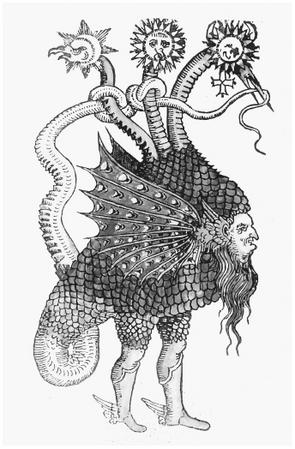Paracelsus
GERMAN PHYSICIAN, ALCHEMIST, AND SCIENTIST
1493–1541
Paracelsus was born Theophrastus Bombastus von Hohenheim. He was a contemporary of Martin Luther and Nicolaus Copernicus. He adopted his

pseudonym based on his assertion that he was a better physician than Celsus, the first century C.E. Roman author on medicine acclaimed in Renaissance Europe (he was "Para-Celsus," or beyond Celsus). His self-promotion as "The Most Highly Experienced and Illustrious Physician … " has given us the word "bombastic," derived from his birth name.
Paracelsus gained his early medical knowledge from his father, who was a physician. He followed this education with formal medical training at the University of Ferrara in Italy. Finding his formal training disappointing, Paracelsus embarked on a life of travel and study combined with medical practice. According to Paracelsus, he collected medical knowledge anywhere he could find it without regard to academic authority. He acknowledged his consultations with peasants, barbers, chemists, old women, quacks, and magicians. Paracelsus developed his notions of disease and treatment away from any established medical faculty and promoted the idea that academic medical training had reached a state deeply in need of reform.
Paracelsus believed in the four "Aristotelian" elements of earth, air, fire, and water. His medical theory was based on the notion that earth is the fundamental element of existence for humans and other living things. Paracelsus believed that earth generated all living things under the rule of three "principles": salt, sulfur, and mercury. He therefore believed these substances to be very potent as chemical reactants, as poisons, and as medical treatments. (Indeed, salt and sulfur can yield strong mineral acids, for example, hydrochloric acid and sulfuric acid, and mercury is a strong poison.) Finally, Paracelsus believed in the "Philosopher's Stone." The Philosopher's Stone (which he sometimes claimed to possess) was supposed to cure all ills and to enable the transformation of any metal into gold. Such a stone, it was believed, would be the strongest chemical reactant and the strongest medicine possible.
Paracelsus advocated the direct observation of a patient's medical condition and the assessment of his or her surroundings. He was one of the first physicians to describe occupational diseases. He described several lung diseases of miners and recommended improved ventilation as a means of their prevention. He emphasized that the legitimacy of a treatment was whether or not it worked, not its recommendation by an ancient authority in an ancient text. Paracelsus promoted the use of mineral treatments. Because small amounts of mercury salts were effective against some illnesses, these medicines were judged to be very strong.
Paracelsus's exalted claims for himself and his abrasive personality often brought him into conflict with civil authorities. His methods of trial and error and observation led him to reject the use of sacred relics as medical treatment. It brought him into conflict with religious authorities. His calls for reformation of the medical profession offended medical authorities. As a consequence he was on the move often. Paracelsus held an academic post only once, and it lasted only a year. Although he wrote a great deal, only one of his manuscripts was published in his lifetime. Most of his manuscripts were left in a variety of cities and were published several years after his death. Within these manuscripts are inconsistencies and contradictions. Paracelsus never established any one strong school of thought or medical practice. He did, however, influence future generations of iatrochemists (physicianchemists, iatro being Greek for "physician"), who continued to apply chemistry to questions of medical practice.
SEE ALSO Alchemy .
David A. Bassett
Bibliography
Jacobi, Jolande, ed. (1942, reprint 1988). Paracelsus, Selected Writings, tr. Norbert Gutman. Princeton, NJ: Princeton University Press.
Partington, J. R. (1961). A History of Chemistry, Vol. 2. New York: Martino Publishing.
Sigerist, Henry E., ed. (1941, reprint 1996). Paracelsus: Four Treatises. Baltimore: Johns Hopkins University Press.
Comment about this article, ask questions, or add new information about this topic: